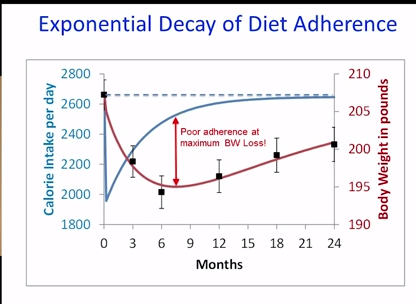Mathematics of weight loss

yarwell
Posts: 10,477 Member
If you're interested and have an hour to spare :-
 https://www.youtube.com/watch?v=hPi1LQHBWBk
https://www.youtube.com/watch?v=hPi1LQHBWBk
warning, contains math.
 https://www.youtube.com/watch?v=hPi1LQHBWBk
https://www.youtube.com/watch?v=hPi1LQHBWBkwarning, contains math.
0
Replies
-
I got 5 minutes in and there's already a flaw in logic/ridiculous statement in his presentation (where he says that the guy consuming a constant diet of 2500 calories at a 500 calorie deficit would just disappear). I'm not terribly motivated to continue watching, given that.0
-
yes that is an extrapolation beyond reasonableness. It's the same extrapolation as MFP's dodgy "in 5 weeks" which was the point - it isn't linear and there are feedback loops to consider.0
-
mamapeach910 wrote: »I got 5 minutes in and there's already a flaw in logic/ridiculous statement in his presentation (where he says that the guy consuming a constant diet of 2500 calories at a 500 calorie deficit would just disappear). I'm not terribly motivated to continue watching, given that.
Disappear? Like time travel and *kitten*?? I'm in.0 -
mamapeach910 wrote: »I got 5 minutes in and there's already a flaw in logic/ridiculous statement in his presentation (where he says that the guy consuming a constant diet of 2500 calories at a 500 calorie deficit would just disappear). I'm not terribly motivated to continue watching, given that.
Basically the idea is that the traditional formula is not a good predictor of the weight loss, while he proposes a "dynamic" model.
Here is his java application:
http://bwsimulator.niddk.nih.gov/
I took a look at the app, and the maintenance calories suggested to me are way higher than the common web calculators. I suppose it has to be tried to find out how much accurate is.
0 -
My point is that his little example isn't even based on how it would work at all. At 2500 calories, weight loss would stop at some point. The man would not just disappear. He'd have to keep decreasing his caloric intake to keep losing until he wasn't eating anything and then he'd starve to death. The illustration wasn't even based on how the model that he was trying to disprove is supposed to work.0
-
I haven't watched the video yet, but I'm slogging through the mathematical addendum at the URL. Nothing seems outrageous yet, although differential equations are the reason I learned to program computers.0
-
Not all that impressed. I think there is something parameterized in there improperly. It had me eating nearly twice the calories that I am now to accomplish more or less what I'm doing now.
I suspect it uses BMI as a proxy for body fat because it didn't actually ask me what mine is. I know that's hard to know accurately. Also, I exercise for an hour a day, 4 days a week at, according to my HRM, around 130 BPM average (max is usually around 170-ish). Based on their criteria, my activity level was strenuous.
I have their equations, I may write my own version of this.0 -
This video is unreal, I love it! Best link I've ever seen posted on a weight loss forum. I don't think that you'll find many acceptors of this on MFP since he's proposing something other than the simplistic "3500, CICO, rabble rabble" stuff championed here.
Kevin Hall (the lecturer) is one of the world's leading experts on metabolism and obesity. He has 95 peer reviewed publications, including world-leading journals like The Lancet. This guy KNOWS his stuff. It doesn't matter if people see this and don't believe it... what you believe doesn't matter, this guy is preaching facts.
Great link, great contribution to the forum, I highly recommend people check out Dr. Hall's calculator.
http://www.niddk.nih.gov/research-funding/at-niddk/labs-branches/LBM/integrative-physiology-section/body-weight-simulator/Pages/body-weight-simulator.aspx0 -
I liked the back-calculation of food intake from the classic outpatient diet study at about 48 mins. Rather than the typical narrative of reduced metabolic rate with calorie restriction and weight loss matching energy expenditure to cause a plateau he showed it to be progressive food intake increase :-

0 -
I suspect it uses BMI as a proxy for body fat because it didn't actually ask me what mine is. I know that's hard to know accurately.
the standard input screen calculates body fat from other things, if you select "Advanced Controls" on the right hand side of the applet you get to input a lot more on the left.
0 -
mamapeach910 wrote: »My point is that his little example isn't even based on how it would work at all. At 2500 calories, weight loss would stop at some point.
It's called "Reductio ad absurdum" - extending an argument to the point of absurdity to test it / discredit it. If the weight loss doesn't continue at the same rate for ever, then it starts to change at some point. If that point is day 2 then extrapolating 500 cals/day to be 1 lb/week fails because by day 3 the deficit is no longer 500 calories.
Hall has previously stated that 500 cals/day = 1lb/week is wrong, in the way it is typically used.
500 cals/day = 50 lb loss over several years with about 25 lbs in the first year. Or 500 cals/day = 0.5 lbs/week average over the first year would be closer to his results.0
This discussion has been closed.
Categories
- All Categories
- 1.4M Health, Wellness and Goals
- 397.5K Introduce Yourself
- 44.3K Getting Started
- 260.9K Health and Weight Loss
- 176.3K Food and Nutrition
- 47.6K Recipes
- 232.9K Fitness and Exercise
- 459 Sleep, Mindfulness and Overall Wellness
- 6.5K Goal: Maintaining Weight
- 8.7K Goal: Gaining Weight and Body Building
- 153.4K Motivation and Support
- 8.3K Challenges
- 1.3K Debate Club
- 96.5K Chit-Chat
- 2.6K Fun and Games
- 4.6K MyFitnessPal Information
- 16 News and Announcements
- 19 MyFitnessPal Academy
- 1.5K Feature Suggestions and Ideas
- 3.1K MyFitnessPal Tech Support Questions




